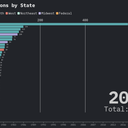
In Pennsylvania, death-row prisoners whose convictions or death sentences are overturned in state or federal post-conviction appeals are almost never resentenced to death, a new Death Penalty Information Center study has revealed. Since Pennsylvania adopted its current death-penalty statute in September 1978, post-conviction courts have reversed prisoners’ capital convictions or death sentences in 170 cases. Defendants have faced capital retrials or resentencings in 137 of those cases, and 133 times — in more than 97% of the cases — they received non-capital dispositions ranging from life without parole to exoneration. Only four prisoners whose death sentences were reversed in post-conviction proceedings remain on death row.
Philadelphia cases accounted for more than half of the post-conviction reversals (86 cases) and 54% of the non-capital case dispositions (72 cases). DPIC reviewed all of the cases in which Pennsylvania death-row prisoners have won post-conviction relief. Contrary to the often-expressed perception that most death-penalty reversals occur in federal courts, state courts reversed twice as many Pennsylvania capital convictions or death sentences as did their federal counterparts. Pennsylvania death-row prisoners obtained state post-conviction relief from their convictions or death sentences — and, in some instances, both — in 116 cases. State courts granted 18 post-conviction petitioners new trials and vacated 108 death sentences. Of the vacated sentences, the state courts granted 91 new sentencing hearings, and declared prisoners constitutionally ineligible for the death penalty in 17 cases. Life sentences were imposed in fifteen cases as a result of a prisoner’s intellectual disability and in two cases because the prisoner had been younger than age 18 at the time of the offense.
Federal courts granted Pennsylvania capital habeas corpus petitioners relief from their convictions and/or death sentences in 58 cases, awarding new trials in 24 cases and new sentencing hearings in 44. Three death-row prisoners who were granted penalty-phase relief in state court later overturned their convictions in federal court. One prisoner who was granted a new penalty-phase trial by the federal courts also overturned his conviction after the case was remanded back to the state courts.
The DPIC study found that 86% of the reversed death-penalty cases concluded with a non-capital resentencing to life without parole. Those included 89 cases resulting from sentencing pleas or prosecutorial decisions to drop the death penalty, 12 capital sentencing retrials that resulted in life sentences, and the 17 cases in which defendants were declared constitutionally ineligible to face the death penalty. Two formerly death-sentenced prisoners—Nicholas Yarris and Harold Wilson—were exonerated, and a third, Frederick Thomas, died on death row while Philadelphia prosecutors appealed a trial judges’ ruling that new evidence presented in the post-conviction proceedings established that no jury would have convicted him. Thirteen prisoners — including several widely considered to be innocent — pled guilty or no contest to lesser murder charges and were sentenced to time served or to terms of years. Six have completed their sentences and two others have been released on parole.
The DPIC study found that the odds were 33.25 to 1 against a prisoner who won post-conviction relief remaining on death row. Six defendants were resentenced to death, but two of those death sentences were later overturned and the defendant resentenced to life without parole. The remaining four death sentences are still on appeal. Calling Pennsylvania’s death-penalty system “riddled with flaws, …error prone, expensive, and anything but infallible,” Govenor Tom Wolf in February 2015 imposed a moratorium on executions in the Commonwealth. The state has not carried out an execution since 1999.
(Robert Brett Dunham, Pennsylvania Post-Conviction Reversals and Subsequent Dispositions, Death Penalty Information Center, April 23, 2018.) Read Governor Wolf’s Moratorium Declaration. See Pennsylvania, Sentencing, and Life Without Parole.



